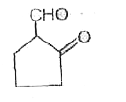An organic compound does not reacts with Tollen's reagent but undergoes Baeyer Villiger oxidation. The compound is
CH≡C−CH2COCH3

CH3CHO
CH3−C∣∣O−CH3
The correct Answer is:D
To solve the problem, we need to analyze the characteristics of the organic compound based on the given tests: Tollen's reagent and Baeyer-Villiger oxidation.
Step 1: Understand the Tests
- Tollen's Reagent Test: This test is used to identify aldehydes and terminal alkynes. A positive result indicates the presence of these functional groups.
- Baeyer-Villiger Oxidation: This reaction is characteristic of ketones, particularly aliphatic ketones. It involves the oxidation of ketones to esters.
Step 2: Analyze the Given Information
The problem states that the organic compound does not react with Tollen's reagent. This means that the compound cannot be an aldehyde or a terminal alkyne, as both would give a positive result with Tollen's reagent.
Step 3: Identify Possible Functional Groups
Since the compound does not react with Tollen's reagent, we can eliminate:
- Aldehydes: They would give a positive Tollen's test.
- Terminal Alkynes: They would also give a positive Tollen's test.
This leaves us with ketones as the possible functional group.
Step 4: Confirm the Baeyer-Villiger Oxidation
The problem states that the compound undergoes Baeyer-Villiger oxidation, which is typical for aliphatic ketones. Therefore, the compound must be an aliphatic ketone.
Step 5: Conclusion
Based on the analysis, the organic compound that does not react with Tollen's reagent but undergoes Baeyer-Villiger oxidation is an aliphatic ketone.
Final Answer
The compound is an aliphatic ketone.
---
- Tollen's Reagent Test: This test is used to identify aldehydes and terminal alkynes. A positive result indicates the presence of these functional groups.
- Baeyer-Villiger Oxidation: This reaction is characteristic of ketones, particularly aliphatic ketones. It involves the oxidation of ketones to esters.
The problem states that the organic compound does not react with Tollen's reagent. This means that the compound cannot be an aldehyde or a terminal alkyne, as both would give a positive result with Tollen's reagent.
Since the compound does not react with Tollen's reagent, we can eliminate:
- Aldehydes: They would give a positive Tollen's test.
- Terminal Alkynes: They would also give a positive Tollen's test.
The problem states that the compound undergoes Baeyer-Villiger oxidation, which is typical for aliphatic ketones. Therefore, the compound must be an aliphatic ketone.
Based on the analysis, the organic compound that does not react with Tollen's reagent but undergoes Baeyer-Villiger oxidation is an aliphatic ketone.
The compound is an aliphatic ketone.
Similar Questions
Which organic compound can reduces Tollen's reagent ?
View SolutionBaeyer Villiger Oxidation of Ketones.
View SolutionBaeyer Villiger Oxidation of Ketones.
View SolutionBaeyer Villiger Oxidation of Ketones.
View SolutionBaeyer Villiger Oxidation of Ketones.
View SolutionWhich of the following compound does not react with Tollen's reagent?
View SolutionSelect the correct Baeyer-Villiger oxidation reaction:
View SolutionThe compound which does not react with sodium is
View SolutionEthylene reacts with Baeyer's reagent to given
View SolutionWhich of the following does not reduce Tollens reagent .
View Solution
